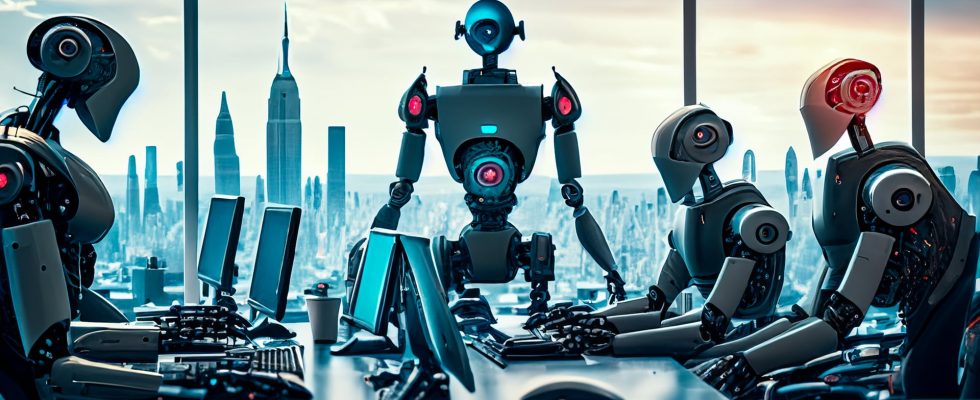A wind of optimism has recently blown across the country. “CocorIAco”, was the headline on the front page of L’Express in mid-March to highlight the place that generative AI is taking in France. On the one hand, because the French technological nuggets are well placed in the global race. On the other, because a massive diffusion of “GenAI” in the French economy could increase GDP by more than 400 billion euros in the ten years to come. However, many citizens do not yet know what to think of generative AI and the impact it will have on work, particularly white-collar work.
More than a third (35%) of French people are indifferent to it, according to a survey carried out in January by Ifop among the general public, on behalf of the Learnthings site. The third edition of Universcience’s critical thinking barometer, in partnership with L’Express, reveals a mixed impression of AI, seen by respondents as presenting “as many risks as advantages”.
These mixed feelings are completely normal. Certainly, the specter of a “major replacement” by AI does not stand up to scrutiny – the report of the commission on AI commissioned by Matignon reveals that only 5% of professions are composed of a majority of tasks that can be automated and are therefore threatened. However, the instructions to follow to transform others are not obvious.
The most daunting tasks should normally be assigned to AI. Those with the least added value, the time-consuming ones. Routines. But this assignment is less natural than it seems. First difficulty: how to determine them? Yann Ferguson, sociologist at the National Institute for Research in Digital Sciences and Technologies (Inria), discusses Polanyi’s paradox and the “tacit” dimension of work. In summary, “the better we are at what we do, the more difficult it is to explain it. Because performance lies in the unspeakable of the experience,” explains the expert who is also scientific director of LaborIA , an interdepartmental group studying the effects of artificial intelligence on work.
The little-known benefits of routine tasks
He also points out the “chaining” effect between routine tasks and more complex ones. Accomplishing the first is sometimes the warm-up that puts employees in the condition to carry out the second: completing these simpler missions gives them self-confidence and puts them in the right mental state. When they start a position, it is also these simple tasks that get them started and introduce them to their new missions. Simple and complex missions therefore form a ball that is not so easy to unravel.
Other possible complications should be monitored. AIs are not impeccably reliable, for example. If we are not careful, this could lead to “a general decline in the quality of what will be produced”, underlines Antonin Bergeaud, professor of economics at HEC. At the risk of generating in the employee the feeling of a job poorly done and leading to a loss of meaning.
The fact that AI modifies the balance of power by open space also has the potential to plunge workers into uncertainty. A study by the BCG Henderson Institute with researchers from Harvard Business School, on consultants, sheds some interesting light on this. With generative AI, it is mainly the less good consultants who have significantly improved their performance to compete with the best. AI will therefore undoubtedly be synonymous with increased competition. “Automation could transform the way a profession evolves, potentially enhancing certain so-called skills. soft“, also predicts Antonin Bergeaud in a note.
What about managers? Cécile Dejoux, professor at the National Conservatory of Arts and Crafts (Cnam) and speaker, warns against management by “notification”: an AI launches tasks here and there without human supervision. But also against the “addiction” that technology can give rise to, which in no way exempts you from knowing how to do the tasks you want to entrust to it yourself. For the expert, the time savings enabled by AI provide the opportunity to practice more careful, more human management. Ultimately, being convinced that AI will improve the world or, conversely, thinking that it will help destroy it, hardly matters at this stage. This will undeniably disrupt the organization of work as we know it. So, some advice: you might as well look into it straight away.
.
